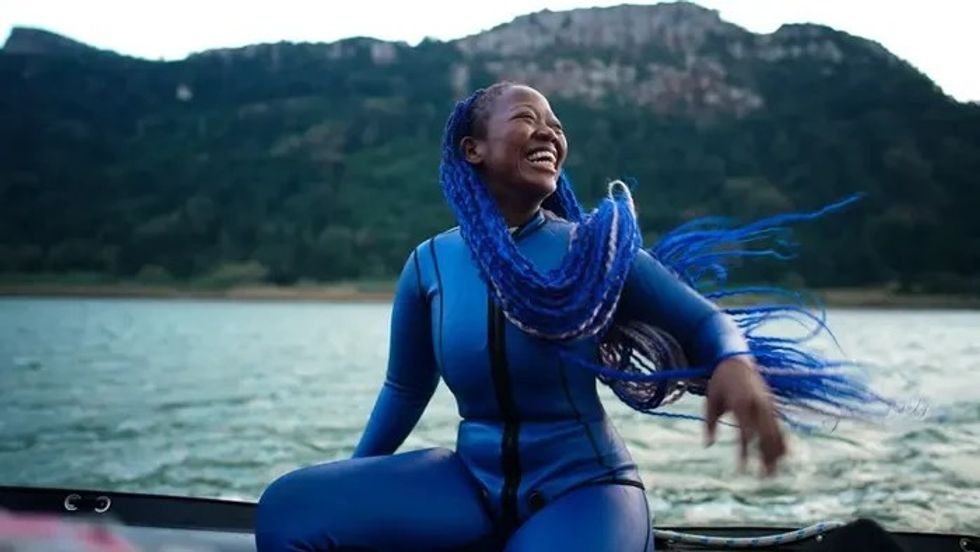From a young age, Zandile Ndhlovu knew she belonged in the water. She was irresistibly drawn to the ocean: the sand, the sun and the pounding waves. Even now, she describes it as “an incredible world filled with wonder.” It hasn’t lost that feeling of discovery and adventure for Ndhlovu, and it probably never will.
Ndhlovu didn’t just want to glance at the coastline from afar. She wanted to be out in the ocean. Swimming was good — but so was being out in a boat. And scuba diving was even better. It opened a new world for Ndhlovu. It was freeing — until people started using it to trap and label her. What was she doing out in the water? Black South Africans taunted her.
The Sea Belongs to Everyone
“Why do you do white people things?” They would ask her with disgust and disbelief. Indeed, Ndhlovu found she was the only Black person out there. Her own family couldn’t understand what was so attractive about the whole thing. For them, the sea was where white people went to do white people things. Ndhlovu disagreed. The sea belonged to everyone.
It called to her so strongly that she decided to give up her full-time job to become a diving instructor. She traded in her “normal”, quiet life for a wetsuit and told her family that she was going to work toward a freediving certification. Her family was shocked.
“My grandmother thought I was crazy,” Ndhlovu remembers, “my whole family did!” But she laughs as she says it. She decided to follow her heart anyway, even if that meant that she’d be treading in unknown waters. When Ndhlovu started her training, there was not a single Black freediving instructor in the whole country.
Stay Out of the Water
That didn’t phase Ndhlovu. She’d become the first. Still, she struggled against perceptions and a history that told her Zulu people to stay out of the water.
“In South Africa, from when you’re young, you’re told endless stories about why you shouldn’t be in the sea,” said Ndhlovu. “Whether it’s stories about how our ancestors live at the bottom of the ocean, or there being a big snake down there, these narratives live in our bodies as Black people.”
As she worked toward certification, though, Ndhlovu realized there was more to the story — a lot more. It wasn’t simply oral tradition and culture that had kept Black people out of South African waters for so long. It was also politics and racism.
During apartheid, Black people had been forcibly removed from their homes, many of which were along the waterfront. They were forced inland or pushed to the most dangerous beaches, unsuitable for swimming or launching boats.
When public swimming pools were built, the admission price was too steep for most Black families. “My mother just never had the money,” Ndhlovu remembers. “Proximity doesn’t equate to access.” Getting out on the ocean required the investment of even more time and money.
Rewriting the Narrative
As she dug deeper and deeper, Ndhlovu started to realize that there was likely even an inherited “historical trauma of the transatlantic slave trade” that kept her people off the shores. Rather than dissuade her, this information made Ndhlovu even more convinced that she had to break the cycle and follow her dream.
Becoming South Africa’s first Black freediving instructor was the first step. But Ndhlovu wanted to do more to encourage more Zulu people to embrace the ocean. And so the Black Mermaid, as she is called, launched the Black Mermaid Foundation. One of the foundation’s first activities was to bring a group of children from Soweto to the ocean. Ndhlovu noted that, at first, the kids were all terrified of the water.
“It’s a wild terror,” she said. “I feel there’s a healing that needs to happen.”
And so Ndhlovu chips away at that terror and shows Black children that the ocean is not a white thing. “That’s why I enjoy teaching: to see the fear leave their eyes and the wonder fill their bodies, and this relationship with the ocean being built.”
Besides access and familiarity with the ocean, Ndhlovu teaches the children how to care for the precious resource. They learn about plastics pollution and use some of their time at the beach to clean it up. By taking care of the ocean and the beach, the children feel a sense of ownership and pride.
“I’m allowing them to believe that this ocean belongs to them too,” says Ndhlovu. It’s not a white people thing — it’s an all people thing. Another step in the right direction for South Africa.

